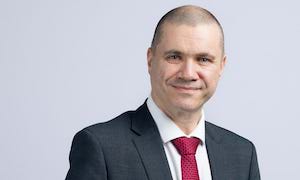By Mark McSherry
The Scottish National Investment Bank (SNIB) said David Ritchie has been appointed to the new role of chief strategy officer at the bank as it seeks to target “third party capital and market creation.”
SNIB said: “David was one of the first employees of the bank, joining in June 2020 as Head of Partnerships & Engagement.
“An economist by trade, David was previously employed by the Scottish Government in a number of roles, including as Head of the Energy Industries.
“David is building on his current remit of leading the bank’s external engagement function, comprising policy, stakeholder relations, communications and marketing.
“He will also now be responsible for the development and implementation of the bank’s commercial strategy as the bank seeks to crowd in third-party capital, as well as lead a focus on market creation for key strategic opportunities.”
Ritchie said: “I’m delighted to take up the new role as CSO. Having been at the bank since the start, I have seen first-hand how we’re maturing as an organisation and the potential the Bank’s investments have to deliver real impact for Scotland.”
SNIB CEO Al Denholm said: “We’re pleased to expand David’s role as we continue to grow and develop the bank.
“Third party capital and market creation are critical elements of our strategy as we look to attract more private sector investment in to the Scottish economy.”
In May, the Scottish National Investment Bank said its fast rate of growth “will slow in the year ahead due to reduced availability of capital.” The bank is an “impact” investor.
In its 2024-45 Business Plan launched in May, the bank said: “From launch to the end of March 2024 we have committed £640 million of investment in support of our missions, £225 million of which was in the last financial year alone.
“The £640 million we have committed has also enabled more than £1 billion to be invested alongside the Bank, accelerating both economic growth and progress towards delivering our missions …
“The amount of investment we have committed and deployed has increased year-on-year since launch, with associated increases in income.
“While the rate of this growth will slow in the year ahead due to reduced availability of capital, our growth will still continue to move us closer to full financial self-sustainability.
“For the Financial Year 2023-2024 (FY23/24) it is anticipated that our income will exceed our operational expenses (on an accounting basis) for the first time.”
The Scottish Government has committed to capitalising the bank with £2 billion in its first 10 years.
The bank said in May that over the longer term “significant investment from private sector capital is needed” if it is to meet its missions — and it will “seek to manage private sector capital alongside the public funds entrusted to us.”
The bank said it was exploring “ways in which we might be able to support this mobilisation of capital” and this may include options such as advising on the investments of third parties in structures like segregated mandates or funds.
“We aspire to become a permanent, growing, investment fund for Scotland,” said the bank.
“To achieve this, we need to ensure that the income we earn from our investment activities more than cover our costs, which will mean that we no longer require financial support from Scottish Ministers for our operational expenditure.
“Surplus income and returns from investment capital can then be re-invested, ultimately enabling us to grow the funds we invest beyond the £2 billion of capital committed by Scottish Ministers. The budget allocation for the year ahead, FY24/25, is clearly in the context of challenging public sector finances.
“However, future settlements can ensure that we avoid the risk that we are unable to deploy £2 billion commitment over 10 years. Without this commitment, we acknowledge challenges to the bank achieving self-sustainability.”
